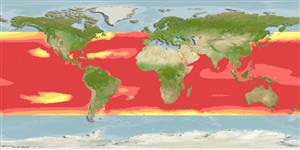Preferred temperature (Ref.
115969): 16.8 - 28.6, mean 26.6 (based on 3638 cells).
Phylogenetic diversity index (Ref.
82804): PD
50 = 0.5039 [Uniqueness, from 0.5 = low to 2.0 = high].
Bayesian length-weight: a=0.01318 (0.01039 - 0.01673), b=3.03 (2.99 - 3.07), in cm Total Length, based on LWR estimates for this species (Ref.
93245).
Mức dinh dưỡng (Ref.
69278): 4.5 ±0.0 se; based on diet studies.
Thích nghi nhanh (Ref.
120179): Trung bình, thời gian nhân đôi của chủng quần tối thiểu là 1.4 - 4.4 năm (K=0.11-0.23; tm=3; tmax=11; Fec=2 million).
Prior r = 0.52, 95% CL = 0.34 - 0.77, Based on 10 full stock assessments.
Fishing Vulnerability (Ref.
59153): High vulnerability (56 of 100).
Climate Vulnerability (Ref.
125649): Moderate to high vulnerability (47 of 100).
